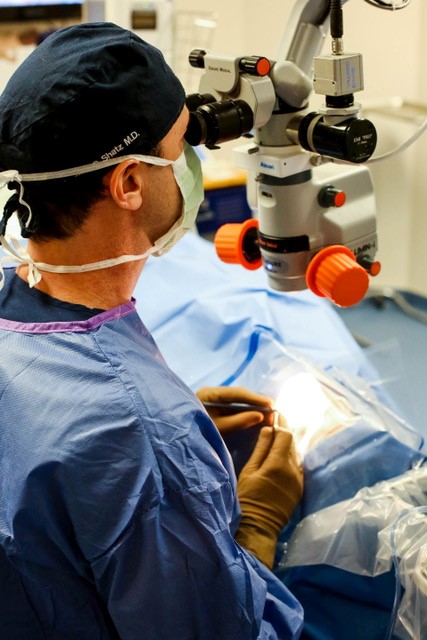Posted by: SightTrust Eye Institute in Presbyopia

Aging is a normal and wonderful part of life; unfortunately, no one escapes it. With age come certain benefits such as retirement or senior discounts, but there are also drawbacks to growing older. If you are 40 or older and you have begun to notice difficulty seeing or focusing on things up close, chances are you probably have presbyopia. Presbyopia comes from the Greek word that means “old eye” occurs as the lenses in our eyes become less elastic and are unable to bend light properly to focus it on your retina, causing near images to appear blurry.
Some common symptoms of presbyopia are:
- Difficulty reading small print.
- Having to hold reading materials further away to focus on the words.
- Headaches from working up close.
- Eye strain.
Oftentimes, presbyopia can be mistaken for farsightedness. It is in fact a separate condition caused by the hardening of the lens that occurs in all of us as we age; farsightedness, on the other hand, is caused by an eyeball that’s too short or a cornea that’s too flat. Presbyopia can be diagnosed with a simple eye exam, which includes a refraction. While there is nothing that can be done to reverse the changes that cause presbyopia, thankfully there are treatments available to correct your vision:
- Glasses
The most common way to treat presbyopia is with glasses. If presbyopia is the only vision problem you have, you may be able to use over-the-counter reading glasses. However, if you also have other vision problems, you may need full-time prescription lenses. These include:
- Bifocals – lenses are split into two sections, one for distance and one for near.
- Trifocals – lenses have three areas to correct for close, mid-range, and distance.
- Progressive Lenses – these lenses are similar to bifocals and trifocals but have no lines.
- Contact Lenses
There are two ways to use contact lenses to treat presbyopia:
- Monovision – one contact corrects an eye for distance and the other is corrected for reading. This can take training for your brain to adapt.
- Multifocals – these lenses provide near and far at the same time.
- Medication
Medicated eye drops sch as Vuity reduce the size of your pupils so they can see things up close. These drops work for six hours, need to be applied every day, and can make it difficult to see in the dark.
- Surgery
If glasses or contacts are not working for you, there are surgical options available to treat presbyopia.
- Laser surgery – A temporary relief of symptoms
These procedures change the shape of your cornea to improve near vision in your non-dominant eye, creating a monovision effect similar to contacts. Types of refractive surgery include:
- Laser-assisted subepithelial keratectomy (LASEK)
- Photorefractive keratectomy (PRK)
- Laser does not treat the cause of presbyopia, and it will return, often in less than 1 year.
- Lens replacement – The permanent vision correction option
Refractive lens exchange replaces your natural lens with a prescription intraocular lens. The most popular implants are multifocal and trifocal lenses. These allow continual focus from distance to computers to cell phones without the need for glasses. The effects are permanent, and this procedure prevents you from developing cataracts in the future, making it a permanent vision correction procedure.
Although everyone will experience presbyopia at some point in their lives, the good news is you have options, and you’re not alone. If you feel you may be experiencing symptoms of presbyopia, call our office today and we’d love to discuss what options or treatments might work best for you. Contact us at: (877) 878-7890 / info@sighttrust.com
Sources:
https://www.mayoclinic.org/diseases-conditions/presbyopia/diagnosis-treatment/drc-20363329
https://www.bettervisionguide.com/7-presbyopia-treatments/
https://www.eyelink.com/2022/04/06/6-top-treatment-options-for-presbyopia/






